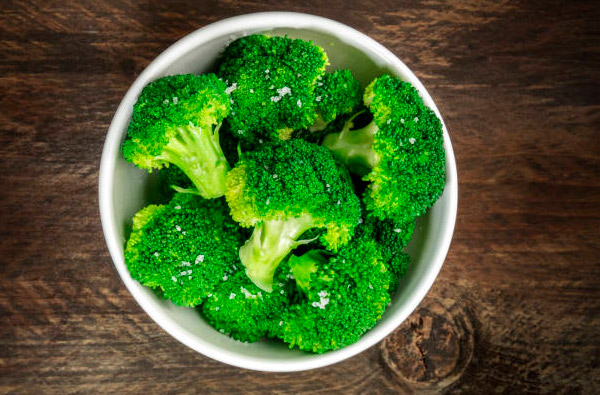New publications
A compound derived from broccoli may prevent and cure stroke
Last reviewed: 29.06.2025

All iLive content is medically reviewed or fact checked to ensure as much factual accuracy as possible.
We have strict sourcing guidelines and only link to reputable media sites, academic research institutions and, whenever possible, medically peer reviewed studies. Note that the numbers in parentheses ([1], [2], etc.) are clickable links to these studies.
If you feel that any of our content is inaccurate, out-of-date, or otherwise questionable, please select it and press Ctrl + Enter.

Every year, approximately 15 million people15 million people around the world suffer a stroke, a cardiovascular disease that occurs when blood and oxygen cannot reach the brain.
Depending on the type of stroke, the main treatment is either using medication to break up blood clots that prevent blood from reaching the brain or stopping blood from entering the brain.
The speed of administration of therapy and its effectiveness are important for stroke recovery.
Researchers estimate that only about 10% of stroke survivors fully recovertitle="Health-Related Quality of Life in Stroke Survivors in Relation to the Type of Inpatient Rehabilitation in Serbia: A Prospective Cohort Study - PMC">And the rest live with impairments or disabilities.
Now researchers from the Heart Research Institute in New South Wales, Australia, have discovered that a naturally occurring chemical element found in broccoli may help both prevent and treat stroke.
More options for stroke treatment and prevention are needed
Previous studies show that stroke is now the second leading cause of death in the world and the leading cause of disability.
"About 85% of stroke cases are caused by blood clots blocking an artery leading to the brain, depriving the brain of essential nutrients," said Dr. Suyu (Johnny) Lydoctor Suyu (Johnny) Lee u, researcher and head of cardiovascular protection and drug discovery at the Heart Research Institute in New South Wales, Australia, and lead author of this study.
"Despite the significance of the problem, there is only one drug called tissue plasminogen activator (tPA), which has been approved to break up these clots, but its efficacy is suboptimal, with a success rate of less than 20%," Dr. Liu continued.
"Therefore, there is an unmet need in the field to improve the efficacy of tPA and identify more treatment options for stroke patients," he added.
Broccoli to aid in stroke treatment
For this study, Dr. Liu and his team turned to a common cabbage vegetabletitle="Cruciferous Vegetables and Their Bioactive Metabolites: from Prevention to Novel Therapies of Colorectal Cancer - PMC">- broccoli.
"Broccoli and other cabbage vegetables contain isothiocyanates, which are known for their chemopreventive and neuroprotective properties," Dr. Liu explained.
"We were curious if isothiocyanates could solve a pressing problem in stroke treatment - finding a safer and more effective blood thinner to synergize with tPA," he said.

This is not the first study examining cabbage vegetables and heart health.
A study published in April 2018, found that eating more cabbage vegetables may help prevent atherosclerosis, or clogged arteries, a major risk factor for stroke and heart attack.
A study published in May 2020, known as vESSELtitle="A randomised controlled crossover trial investigating the short-term effects of different types of vegetables on vascular and metabolic function in middle-aged and older adults with mildly elevated blood pressure: the VEgetableS for vaScular hEaLth (VESSEL) study protocol - PMC">Correlated higher consumption of cabbage vegetables with a lower risk of cardiovascular disease.
Enhancement of clot-busting drugs without additional bleeding
In this three-year preclinical study, researchers tested what effect compounds from broccoli have on clot-busting drugs.
"tPA is a drug designed to treat specific types of stroke caused by blood clots blocking blood vessels in the brain. It acts as a molecular plumber, breaking down the clot to restore blood flow. However, enzymes and chemicals released from the broken clots can activate platelets, potentially leading to the formation of new clots at the same site," Dr. Liu said.
"A large number of antithrombotic agents have been studied in combination with tPA to improve vascular clearance; however, they unfortunately increase the risk of bleeding into the brain, the most dangerous complication of tPA therapy. Therefore, the discovery of antithrombotic agents that can improve the clot-busting, clot-busting potential of tPA, without causing bleeding, would represent a significant advance in stroke treatment," he explained.
Dr. Liu said his team's discovery of a natural compound found in broccoli called glucoraphanin, which converts to sulforaphane when consumed, is a breakthrough.
The various compounds in broccoli, including the end product - sulforaphanetitle="The Integrative Role of Sulforaphane in Preventing Inflammation, Oxidative Stress and Fatigue: A Review of a Potential Protective Phytochemical - PMC">Have shown protective, anti-inflammatory and antioxidant properties, they are also rich in fiber which helps reduce cholesterol plaques in the arteries, support healthy gut microbiota and also include many heart-protective vitamins and minerals such as C, B9 (folate), potassium and vitamin K which plays a role in blood clotting.
"Sulforaphane uniquely inhibits platelet aggregation in pathologic conditions without causing significant bleeding in preclinical models, tripling the efficacy of tPA and slowing the formation of harmful clots leading to stroke," he added.
Delaying the onset of stroke
At the conclusion of the study, the researchers found that adding a compound from broccoli to tPA increased the drug's success rate by up to 60%.
"The significant increase in success without noticeable bleeding was unexpected. This synergistic effect is as good as the best anticoagulants and antiaggregants in the field, yet it does not impair vital clot formation, an ability that has not been achieved by existing antithrombotic agents tested with tPA," said Dr. Liu.
In addition, the researchers reported that during initial testing, once the molecules from broccoli were introduced, they helped slow the onset of stroke.
"The result was expected given the extensive evidence of the effects of broccoli and other cabbage vegetables on stroke prevention," Dr. Liu said.
"We hypothesized that broccoli's most bioactive compound would reflect these preventive effects observed in clinical trials. Importantly, our research also elucidated the mechanisms of stroke prevention, offering a detailed understanding of the health benefits of this natural product extracted from broccoli at the molecular and cellular levels," he added.
"The unique molecular mechanism of this natural product, which prevents clot formation in various pathologic conditions without preventing hemostatic clot formation, offers promising therapeutic applications," he explained.
"We plan to use this natural product as a tool to identify novel protein targets and cell signaling pathways involved in stroke," Dr. Liu continued.
"Our goal is to identify new protein targets to develop precision medicine. We are also exploring natural products from other vegetables known for their stroke and thrombosis prevention properties. Integrating this molecular knowledge into nutritional strategies could significantly reduce the risks of stroke and thrombosis," he added.
The study was recently published in the ACS Central Science journal of the American Chemical Society.
